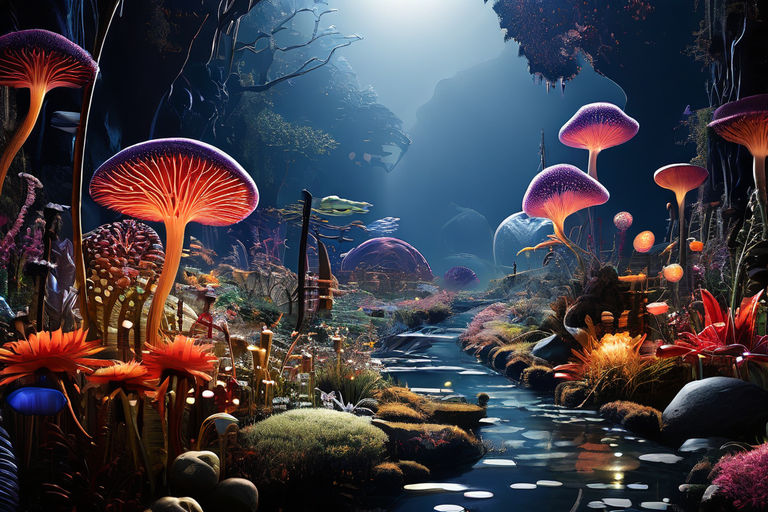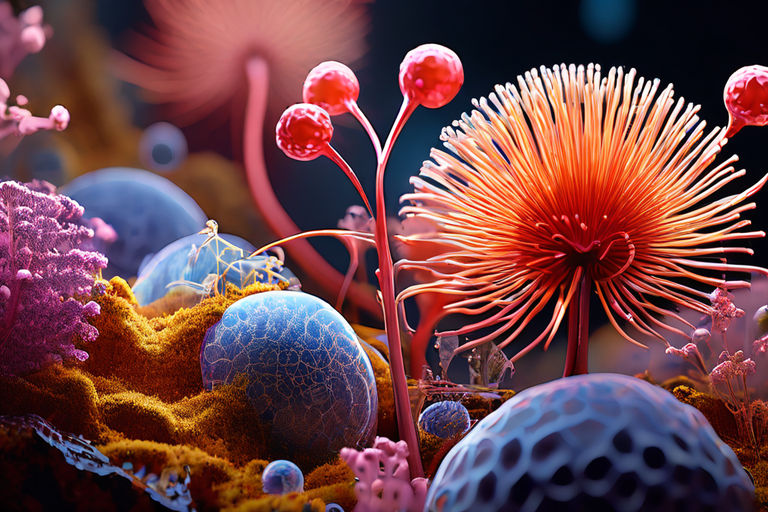Introduction
In today’s ever-evolving scientific landscape, contemporary biology stands at the forefront of innovation and discovery. From unraveling the mysteries of the human genome to exploring the intricacies of ecosystems, contemporary biology encompasses a vast array of disciplines, each contributing to our understanding of life on Earth. In this article, we embark on a journey to explore the essence of contemporary biology, delving into its core principles, latest advancements, and real-world applications.
what is contemporary biology
Contemporary biology, at its essence, explores the complex web of life, the relationship between living organisms and their ever-changing environment. Through the lens of modern science, contemporary biology unravels the mysteries of existence, using countless advanced tools and methods. At its core, the field serves as a nexus where different scientific disciplines come together, each contributing a unique perspective to the collective understanding of life’s complexities.
Genetics stands as one of the cornerstones of contemporary biology, providing insight into the hereditary processes that control biological inheritance. By deciphering the genetic code encoded within the DNA molecule, scientists unlock the secrets of heredity, trace the lineage of organisms, and uncover the genetic basis of traits and diseases.

Molecular biology, another integral component of contemporary biology, explores the fundamental processes that affect life at the molecular level. From the intricate dance of proteins to the orchestrated symphony of cellular signaling pathways, molecular biologists delve into the inner workings of cells, uncovering the molecular machinery that drives biological events.
Ecology, on the other hand, takes a holistic view of life, studying the interconnections between organisms and their environment. From the delicate balance of ecosystems to the complex dynamics of food webs, ecologists explore the complexities of nature, trying to understand the factors that shape biodiversity and ecosystem stability.
Evolutionary biology provides a historical perspective on the journey of life, tracing the origin and diversification of species over millions of years. By studying the processes of natural selection, genetic drift, and speciation, evolutionary biologists explain the mechanisms driving evolutionary processes, shedding light on the origins of biodiversity and the emergence of countless forms of life.
Bioinformatics has emerged as a cutting-edge discipline within contemporary biology, harnessing the power of computational tools and data analysis techniques to decipher vast repositories of biological information. From genome sequencing to protein structure prediction, bioinformaticians wade through mountains of data, extracting meaningful insights that drive advances in fields from medicine to agriculture.
Together, these diverse disciplines form the tapestry of contemporary biology, bringing together strands of knowledge to address some of the most pressing challenges facing humanity. Whether uncovering the genetic basis of disease, mitigating the effects of climate change, or protecting biodiversity in the face of habitat loss, contemporary biology serves as a beacon of hope, lighting the way to a more sustainable and harmonious relationship with the natural world.
Advancements in Genomics and Molecular Biology
In contemporary biology, genomics and molecular biology stand as cornerstones, reshaping our understanding of genetic complexity and molecular phenomena. Driven by breakthrough technologies such as next-generation sequencing and CRISPR-Cas9 gene editing, these fields are leading a paradigm shift. With these tools at their disposal, scientists unravel the genetic code with unparalleled precision to discover the very fabric of life.
Next-generation sequencing techniques enable rapid and cost-effective analysis of entire genomes, allowing researchers to explore the genetic makeup of organisms in unprecedented depth. By sequencing DNA molecules at lightning speed, scientists can uncover hidden genetic variations, track evolutionary trajectories, and identify the genetic causes of underlying diseases.
On the other hand, CRISPR-Cas9 gene editing gives scientists the ability to precisely modify DNA sequences with surgical precision. This revolutionary technology offers a versatile toolkit for manipulating genes, enabling targeted edits to correct genetic defects, engineer desired properties, and uncover the complexities of gene function. From fighting genetic diseases to engineering drought-resistant crops, CRISPR-Cas9 holds immense potential for advancing both human health and agricultural sustainability.
Through the lens of genomics and molecular biology, scientists gain unprecedented insight into the mechanisms driving diseases from cancer to genetic disorders. By deciphering the molecular pathways that underpin disease progression, researchers can identify novel therapeutic targets, develop precision medicine, and tailor treatments to individual patients’ genetic profiles.
Furthermore, genomics and molecular biology shed light on evolutionary patterns, elucidating the processes driving species diversity and adaptation. By comparing genomes across different species, scientists uncover genetic signatures of evolution, trace the footprints of ancient ancestors, and unravel the mysteries of biodiversity.
In the field of conservation biology, genomics provides powerful tools for protecting endangered species and preserving ecosystems. By analyzing genetic diversity within populations, researchers can assess population health, identify individuals for breeding programs, and inform conservation strategies aimed at preserving genetic diversity and mitigating the effects of habitat loss and fragmentation.
In short, genomics and molecular biology act as catalysts for transformational change, revolutionizing our understanding of the building blocks of life and empowering us to address some of the most pressing challenges facing humanity and the natural world.
Emerging Trends in Synthetic Biology
Synthetic biology has emerged as a dynamic frontier in contemporary biology, dedicated to the creation of innovative biological systems tailored for diverse applications. At its core, synthetic biology utilizes principles from engineering, genetics, and computer science to engineer novel microorganisms with specialized functionalities.
This interdisciplinary approach enables synthetic biologists to design and build biological systems from the ground up, using the inherent programmability of DNA to engineer cells with desired properties and behaviors. By reprogramming the genetic code of microorganisms, researchers can orchestrate complex biological processes with precision, unlocking countless potential applications across a variety of sectors.
One of the key areas of focus in synthetic biology is the production of biofuels, pharmaceuticals and sustainable materials. By engineering microorganisms to serve as living factories, synthetic biologists can optimize metabolic pathways to efficiently convert renewable resources into valuable products. From biofuels derived from plant biomass to pharmaceuticals synthesized through microbial fermentation, synthetic biology offers a sustainable alternative to traditional manufacturing processes, reducing dependence on fossil fuels and reducing environmental impact.

Moreover, synthetic biology holds the promise of revolutionizing agriculture and food production. By engineering crops with increased resilience to environmental stresses and pests, synthetic biologists can strengthen food security and mitigate the effects of climate change on agricultural systems. Furthermore, the development of synthetic biology-based solutions for crop improvement, such as precision breeding and gene editing technologies, offers new ways to increase crop yields, nutrients and resilience to emerging agricultural challenges.
In addition to its applications in industry and agriculture, synthetic biology also has the potential to address global health challenges. By engineering microorganisms to produce therapeutic proteins, vaccines and diagnostic tools, synthetic biologists contribute to the development of innovative healthcare solutions. Furthermore, the use of synthetic biology techniques for biosensing and environmental monitoring enhances rapid detection and response to disease outbreaks and environmental hazards, public health preparedness and response capacity.
In short, synthetic biology represents a frontier of innovation within contemporary biology, offering unprecedented opportunities to engineer biological systems for a wide range of applications. By harnessing the power of genetic engineering and computational design, synthetic biologists pave the way for a bio-based economy characterized by sustainability, efficiency and resilience.
Exploring the Dynamics of Ecosystems
Contemporary biology ventures beyond the microscopic realm to embrace the study of ecosystems and their complex interplay. Ecologists, at the forefront of this exploration, use sophisticated modeling methods and sophisticated remote sensing technologies to unravel the mysteries of ecosystem dynamics.
These advanced techniques enable ecologists to penetrate the complex web of interactions between organisms and their environment, shedding light on the underlying processes that drive ecosystem functioning. By analyzing biodiversity patterns, nutrient cycles and energy flows, researchers gain insight into ecosystem resilience and stability in the face of environmental change.
Furthermore, remote sensing technologies, such as satellite imagery and drones, provide ecologists with bird’s-eye views of ecosystems across different spatial and temporal scales. From tracking changes in land cover and vegetation dynamics to monitoring wildlife populations and habitat fragmentation, remote sensing provides invaluable information for understanding the impact of human activities on natural habitats.
By combining data from field observations, experiments, and remote sensing, ecologists piece together the puzzle of ecosystem dynamics, identify key drivers of change, and predict future trajectories. These insights inform conservation strategies aimed at conserving biodiversity, restoring degraded ecosystems, and mitigating the effects of human-induced disturbances.
Furthermore, contemporary biology emphasizes the importance of interdisciplinary collaboration in addressing complex environmental challenges. Bringing together scientists from a variety of fields, including ecology, conservation biology, climatology, and the social sciences, researchers develop holistic approaches to ecosystem management that balance ecological, economic, and social objectives.
In essence, contemporary biology underscores the interconnectedness of life on Earth and the imperative of stewardship in protecting our planet’s natural heritage. By uncovering the complex relationships between species and their environments, ecologists pave the way for informed decision-making and sustainable resource management practices that ensure the well-being of both current and future generations.
Interdisciplinary Approaches to Biomedical Research
In the field of biomedicine, interdisciplinary collaboration acts as a catalyst for innovation and accelerates the pace of scientific progress. Combining insights from biology, chemistry, physics, and computational science, researchers tackle complex health challenges with multidimensional approaches.
At the forefront of this collaborative effort is research to combat millions of diseases worldwide, including cancer, infectious diseases and neurodegenerative disorders. Using diverse expertise and cutting-edge technology, scientists strive to uncover the molecular mechanisms underlying these conditions and develop targeted therapies that offer hope for patients.
Central to this effort is drug discovery, where interdisciplinary teams work tirelessly to identify new therapeutic targets and develop novel compounds with the potential to treat or even cure disease. From traditional pharmacology to innovative approaches such as immunotherapy and gene editing, contemporary biology offers a diverse toolkit to combat a wide range of diseases.
Furthermore, the advent of personalized medicine has revolutionized the way we approach healthcare, tailoring treatments to individual patients based on their unique genetic makeup, lifestyle factors and disease profiles. Using advances in genomics, bioinformatics, and precision diagnostics, researchers strive to optimize treatment outcomes and minimize adverse effects, ushering in a new era of patient-centered care.
Interdisciplinary collaborations play an important role in advancing our understanding of disease mechanisms and developing innovative diagnostic tools. Combining insights from physics and engineering, researchers develop cutting-edge imaging technologies, biosensors and wearable devices that enable early detection and monitoring of disease, paving the way for more effective interventions.
Moreover, contemporary biology is expanding beyond the boundaries of traditional laboratory research to embrace translational and clinical research, bridging the gap between basic science and clinical practice. By fostering collaboration between scientists, clinicians, and industry partners, researchers accelerate the translation of scientific discoveries into tangible benefits for patients, drive progress toward better health outcomes, and improve quality of life.
In essence, interdisciplinary collaboration is at the heart of biomedical research, driving innovation and transforming our approach to healthcare. By leveraging the combined expertise of various disciplines, contemporary biology offers promising ways to address health challenges and improve human health and well-being worldwide.
Harnessing the Power of Big Data and Bioinformatics
The rise of big data analytics and bioinformatics marks a transformational milestone in our approach to analyzing and understanding biological data. With the exponential growth of datasets and the development of sophisticated computational algorithms, bioinformaticians are at the forefront of unraveling the complexities of genomics.

Using large amounts of biological data, bioinformaticians use computational tools to decipher the complex genetic code encoded within DNA molecules. Through advanced data analysis techniques, they identify genetic variations, regulatory elements and functional annotations, shedding light on the mechanisms underlying biological processes.
One of the major contributions of bioinformatics is biomarkers—biological indicators that can indicate the presence of disease or predict treatment outcomes. By correlating genetic variation with disease phenotypes, bioinformaticians identify biomarkers that have diagnostic, prognostic, or therapeutic significance, enabling early detection and personalized treatment approaches.
In addition, bioinformatics plays an important role in the advancement of precision medicine—an approach that requires treatment for individual patients based on their genetic makeup, lifestyle, and environmental factors. By analyzing clinical information as well as genomic data, bioinformaticians guide healthcare providers in selecting the most effective therapies with minimal side effects, resulting in better patient outcomes and improved quality of care.
In addition to its applications in healthcare, bioinformatics drives innovation in agricultural biotechnology and environmental monitoring. By analyzing genetic information from crops and livestock, bioinformaticians identify traits associated with desirable agronomic traits, such as yield, disease resistance, and nutrient content. This information informs breeding programs aimed at developing resilient and high-yielding crop varieties, contributing to food security and sustainable agriculture.
Similarly, bioinformatics helps environmental monitoring by analyzing DNA sequences from environmental samples to assess biodiversity, identify invasive species, and monitor ecosystem health. Using genomic data, bioinformaticians provide valuable insights into ecological dynamics and inform conservation efforts aimed at conserving biodiversity and mitigating environmental degradation.
In essence, the combination of big data analytics and bioinformatics is revolutionizing our understanding of biology, opening new frontiers in healthcare, agriculture and environmental science. Harnessing the power of computational analysis, bioinformaticians translate biological data into actionable insights that drive scientific discovery and innovation, paving the way for a healthier, more sustainable future.
Ethical Considerations and Societal Implications
As contemporary biology continues to push the boundaries of scientific inquiry, ethical considerations and societal implications come to the forefront. Issues such as gene editing ethics, biopiracy, and environmental justice require thoughtful deliberation and responsible stewardship. By engaging in public dialogue and incorporating diverse perspectives, the scientific community strives to ensure that biotechnological advancements benefit society as a whole.
FAQs
- What are the career prospects in contemporary biology?
|Contemporary biology offers a diverse range of career opportunities, including research scientists, bioinformaticians, biotechnologists, environmental consultants, and science communicators. With the increasing demand for skilled professionals in biotechnology, healthcare, and conservation, pursuing a career in contemporary biology can lead to fulfilling and impactful roles. - How does contemporary biology contribute to environmental conservation? Contemporary biology plays a crucial role in environmental conservation by providing insights into ecosystem dynamics, species interactions, and climate change impacts. Through habitat restoration, biodiversity monitoring, and sustainable resource management strategies, biologists work towards preserving Earth’s natural heritage for future generations.
- Is contemporary biology relevant to everyday life?
Absolutely! Contemporary biology influences various aspects of our daily lives, from the food we eat to the medicines we take. Advances in agricultural biotechnology enhance crop yields and improve food security, while medical breakthroughs in personalized medicine offer tailored treatments for individuals based on their genetic makeup. - What are the ethical implications of genetic engineering in contemporary biology?
Genetic engineering raises complex ethical questions regarding the manipulation of living organisms and the potential consequences for ecosystems and human society. Debates surrounding gene editing technologies like CRISPR-Cas9 often center on issues of consent, equity, and unintended consequences, highlighting the need for robust ethical frameworks and regulatory oversight. - How does contemporary biology address global health challenges? Contemporary biology contributes to tackling global health challenges by driving innovations in disease prevention, diagnosis, and treatment. From vaccine development to infectious disease surveillance, interdisciplinary collaborations leverage biological insights to combat emerging threats such as pandemics and antimicrobial resistance.
- What role does citizen science play in contemporary biology?
Citizen science engages the public in scientific research and data collection, democratizing the process of discovery and fostering community involvement in environmental monitoring, biodiversity surveys, and ecological research initiatives. By harnessing the collective power of citizen scientists, contemporary biology expands its reach and promotes scientific literacy worldwide.
In conclusion, contemporary biology epitomizes the spirit of scientific inquiry and innovation, encompassing diverse disciplines united by a common quest to unravel the mysteries of life. From the microscopic realm of genes to the vast expanses of ecosystems, contemporary biology offers a window into the complexities of the natural world and the transformative power of scientific knowledge. By embracing interdisciplinary collaboration, ethical stewardship, and public engagement, we can harness the full potential of contemporary biology to address global challenges and shape a more sustainable future.


